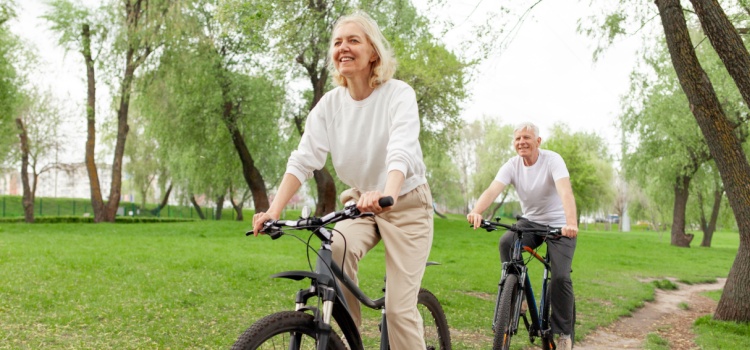6 lifestyle tips that could reduce your biological age

New research and real-life case studies have recently revealed that it’s possible to slow – and even reverse – your biological age.
Read on to discover more about how your biological age is measured, and six simple steps you could incorporate into your routine to enhance your life.
What is your “biological age”?
We’re used to measuring our lives in chronological age, or the number of years we’ve been alive.
But your biological age – which refers to how old your cells and tissues are based on physiological evidence – might be lower or higher than your chronological age, depending on your health.
For example, people who are sedentary, chronically ill, or in poor physical condition might have a higher biological age than someone healthy and fit, even if they both have the same chronological age.
Your biological age may even be able to predict whether you’ll develop diseases such as diabetes or dementia, or how long you will live.
6 practical ways you could lower your biological age
Much of how you age is influenced by genetics beyond your control. But your lifestyle can also have a huge impact.
Switching to a healthier lifestyle and taking control of these factors could help you to become “younger”.
So, if you want to start reducing your biological age, read on to discover the six areas you may want to focus on.
1. Eat healthier
Choosing to eat healthy meals can help to reduce your biological age by giving your body the nourishment it needs to thrive.
The NHS recommends a daily calorie intake of 2,000 calories for women or 2,500 calories for men. However, this might be influenced by other factors such as medical issues, so it’s important to stick with what your doctor recommends.
An easy way to start eating healthier is to aim to eat five portions of fruit and vegetables and drink eight glasses of water a day.
2. Reduce stress
Long-term stress can cause many health problems that could increase your biological age, so it’s important to take time for yourself and remove yourself from people or situations that are causing you chronic stress.
There are several ways you can manage stress, including:
- Practising self-care
- Speaking to a therapist
- Spending time on your hobbies
- Connecting with your loved ones.
Stress can be most overwhelming when we feel like we have no control over it.
Taking back control of your life and actively making changes to improve your mental and physical health is one of the best things you can do to improve your emotional and physical wellbeing.
3. Exercise regularly
The NHS recommends that people between the ages of 19-64 should do at least 150 minutes of moderate intensity activity or 75 minutes of vigorous intensity activity per week, as well as muscle-strengthening exercises.
Taking a brisk walk, cycling to work instead of driving, or dancing around your kitchen a few times a week can help you cut your risk of heart disease and reduce your biological age.
4. Quit smoking and drink less
Drinking excessively and smoking can damage your body in irreparable ways.
Quitting smoking and ensuring you stay within the recommended number of units a week and having rest days between consuming alcohol can help your body to recover and will lower your biological age.
5. Ensure you’re sleeping well
Adults should get between seven and nine hours of sleep every night.
Sleeping more or less than this can increase your risk of cardiovascular disease, diabetes, and other health issues, all of which can increase your biological age.
One of the easiest ways to improve your sleep hygiene is to go to bed and wake up at the same time every day, including weekends. This will train your body to fall asleep faster and you will find yourself waking up feeling more refreshed.
6. Improve your environment
Your physical environment refers to where you live, work, and spend significant amounts of time.
While this can be the factor you have the least control over, it is important to try and keep your environment as safe as possible.
The amount of pollution and other contaminants you are exposed to daily can damage cells and increase your biological age.
For example, if you live in a busy city, it might be worth counteracting some of the effects of pollution by wearing a face mask in public. Or, you might choose to use an air purifier in your home.






